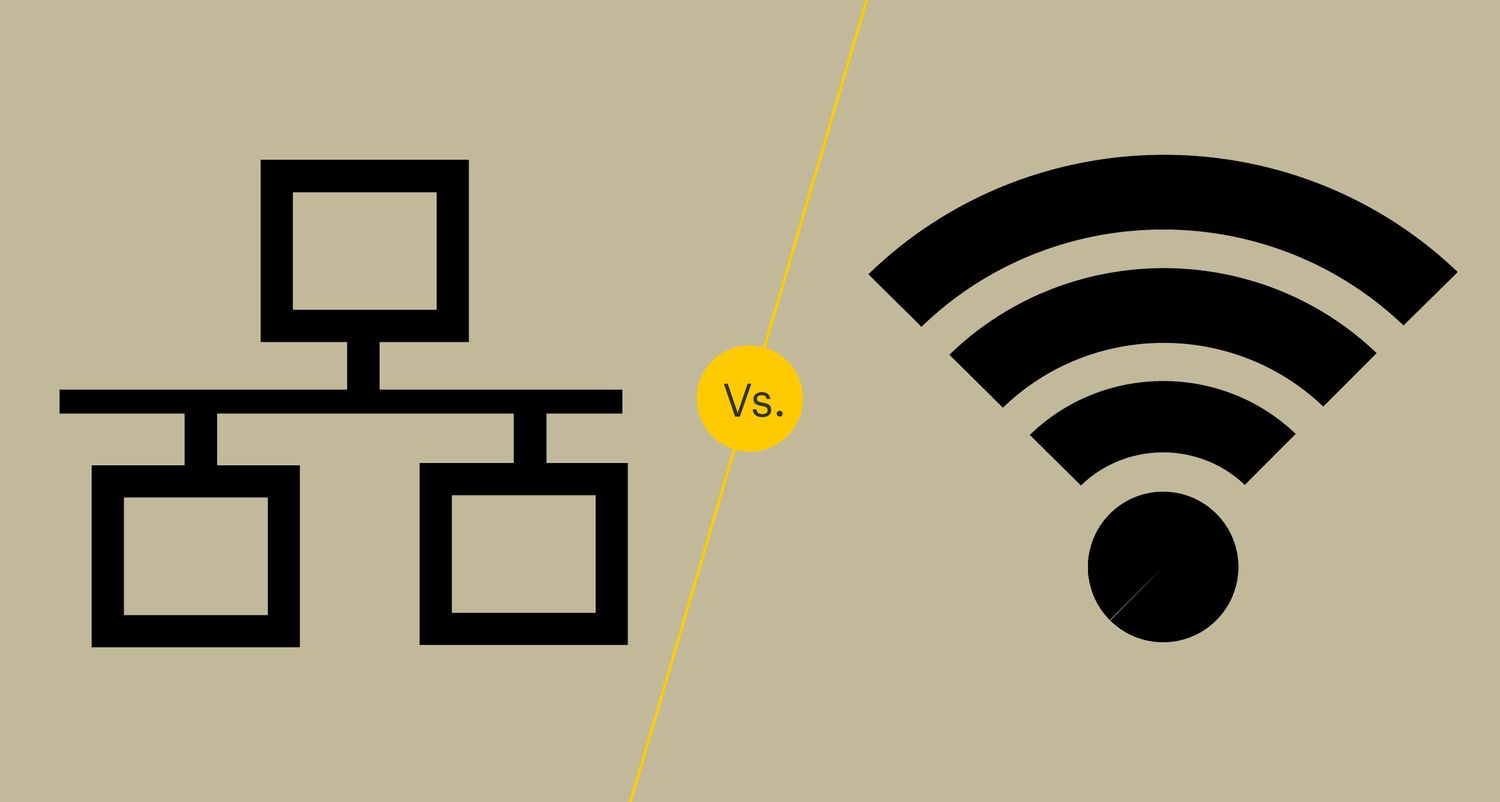
Wired vs wireless home security: which is better?
When it comes to protecting your home, you need a security system you can absolutely trust. Your home is your castle, so give it the care and attention it deserves by investing in a home security system that deters intruders and catches criminals in the act.
However, with so many types of home security cameras and CCTV systems on the market, it can be hard to know what’s best for you and your property. Before you get stuck into the details, the main decision you’ll have to make is choosing between a wired home security system and a wireless home security system. So which one is better? Let’s find out.
What’s the difference between a wired home security system and a wireless home security system?
Naturally, the key difference between a wired system and a wireless system is that one needs wires to function and the other doesn’t. But what does this really mean?
With a wired home security system, the CCTV cameras and sensors are connected to the main control panel with wires, and the system uses mains power and a landline connection to function. These wires usually run along skirting boards and around door frames, and are secured in place to keep them out of the way as much as possible. Typically, as this is a more complex installation process, you’ll need to hire a professional to hardwire these devices, drill into walls or run cables underneath floorboards.
With a wireless home security system, each wireless CCTV camera or sensor uses wireless transmission to send audio and video to the system’s receiver, connecting to your home’s broadband to achieve this. However, this doesn’t mean that all wireless systems contain no wires at all. Many wireless home security systems have a wired connection to your home’s mains power, whereas others are completely wireless and battery-powered.
You can sometimes find hybrid systems on the market too. These home security systems often have a hardwired or plug-in control panel that supports both wired and wireless devices.
Pros and cons of wired security systems
First, let’s take a closer look at wired home security systems. Could this be the right choice for your property?
Pros
1. Reliable connection
Wired home security cameras may be the better choice for you if you don’t trust the strength of your Wi-Fi signal. Wired security systems obviously use a wired connection to function, so if you live in a remote, rural property with unstable Wi-Fi, this is a much more reliable option, allowing you to continue capturing footage 24/7 without relying on Wi-Fi or changing any batteries – keeping your home safe even when you’re away on holiday.
2. No interference
Wired security systems can also be more reliable because they aren’t as vulnerable to signal interference as wireless systems. There have been cases where wireless Wi-Fi cameras were hacked in the past, and sometimes, devices on the same frequency as your wireless CCTV cameras could pick up their signal, reducing their effectiveness.
3. Professional installation
Due to the more complex installation of wired systems, you’ll need a professional to install all of these cables safely and neatly. While this is another cost to consider, it’s much easier to get a professional to install everything for you, rather than doing it yourself and potentially getting it wrong. Wireless systems are usually a DIY solution, which may not be the best option for those who don’t understand tech.
Cons
1. Not portable
One of the main issues with wired home security cameras is that they’re a very permanent solution. While it’s possible to uninstall them and take them with you while moving house, this can be a huge hassle because everything is hardwired into your home or mounted on the walls. As a result, wired security systems typically aren’t used by renters, and due to the more invasive installation involved, many landlords don’t even allow tenants to install wired CCTV cameras.
2. Unsightly wires
Many homeowners are worried about how wired systems will affect the appearance and overall value of their home. Even when the wires are tucked away neatly along skirting boards and door frames, they can still create a bit of an eyesore. Plus, if you have pets, you may be worried about them chewing on the wires if they’re within their reach. In this case, a wireless system may be better for a pet-friendly home, or you’ll at least need to keep the wires out of reach.
3. Longer and more expensive installation
Although a professional installation is more convenient and gives you peace of mind that everything is set up correctly, it’s obviously more expensive than just doing it yourself. Plus, a wired installation takes longer because of the wiring and drilling involved, so this can cause a bigger disruption to your day-to-day life.
While wired systems can often be cheaper than wireless CCTV cameras, these savings can be erased by the cost of installation. Always consider these extra costs in addition to the initial cost of the products when considering what’s within your budget.
Pros and cons of wireless security systems
Nowadays, most customers prefer wireless home security systems over traditional wired systems. But why is this the case, and are there also downsides to consider?
Pros
1. Portable
Since they don’t have wires to install, wireless home security cameras are much more portable and easy to handle. This makes them ideal for renters and those who aren’t 100% certain of where to place their CCTV cameras, as they can easily be repositioned or moved whenever you want.
2. Neat appearance
With no wires to deal with (except for a wire connecting the system to mains power if it doesn’t need batteries), these wireless systems are much more aesthetically pleasing. The lack of wiring and drilling is especially important for renters and those who live in listed buildings, which have more restrictions on what can be done to the structure.
3. Improved technology
Technological advancements have meant that wireless home security systems are now less vulnerable to hacking and signal interference. These systems are now often fitted with anti-jamming technology to keep them secure, and the risk of false alarms has lowered with this increase in signal reliability.
Another key improvement relates to battery-powered wireless CCTV cameras. Many wireless systems now alert you when the batteries are running low, so you can change them on time to continue protecting your property 24/7.
4. Easy installation
Wireless cameras are super easy to install, so you can get the job done yourself instead of paying for costly professional installation. You should be able to get a basic system installed within an hour, and it’ll be even easier if you decide where to place your cameras and sensors beforehand. One thing that could complicate the installation is if you decide to mount your wireless cameras on the wall, but this can be a great solution if you want a more permanent security system.
Cons
1. Potential signal interference
Although signal interference is less of a concern nowadays due to technology advancements, it’s still possible for receivers on the same frequency to pick up a signal from a standard analogue wireless camera. This can compromise the reliability and quality of your security footage.
However, if you use a digital wireless camera, you can reduce the risk of signal interference because these cameras use multiple frequencies to pair the receiver and the camera. This prevents interference from other household appliances and from other people. Plus, the signal of a digital wireless camera is clearer over a longer distance, making them an alternative to wired systems for larger properties.
2. Battery maintenance
If you opt for a battery-powered wireless security system, you’ll need to regularly replace the batteries to keep your system working at all times. This means the system requires more maintenance than a wired system, which uses mains power and can be left alone once installed.
3. Potential range issues
Wired home security cameras are usually recommended for larger properties as the signal tends to be clearer and more reliable over longer distances. However, we do sell specialist wireless cameras with a longer range for large properties and farms, and we also sell high-gain wireless antennae to extend the reach of your wireless signal.
Wired vs wireless home security cameras: which should you choose?
Overall, wireless security systems tend to be more popular these days due to their convenience, portability and suitability for rented properties. Plus, with the advancement of technology, previous issues with signal strength and reliability have been significantly improved.
However, some people still prefer wired security systems because of their signal reliability, particularly over long distances. Wired cameras can also be better on large, remote properties with unreliable Wi-Fi, such as farms (although we do sell wireless security equipment that’s specifically designed for use on farms).
Frequently asked questions about wired and wireless home security systems
How do I install a wireless CCTV camera?
It’s extremely easy to set up a wireless camera by yourself. First, you need to decide where to place your camera – ideally, cameras should be pointed at access points like doors and windows. The easiest option is to just place your camera on a shelf or table, but you can use a drill and mounting screws to mount your camera on a wall for a more permanent security solution.
Next, you need to connect the receiver to a power source by either plugging it into your mains power or adding batteries if you’ve chosen a battery-powered model. Then you can turn on the system’s hub to connect the camera to the receiver. All of these steps should be outlined in your camera’s instruction manual.
How do I install a wireless CCTV camera?
It’s best to get a professional to install your wired CCTV camera unless you’re a qualified electrician. Trying to sort out the wiring yourself could lead to an injury, or you may install the system incorrectly and you won’t be protected against intruders.
Do I need Wi-Fi for a wireless security camera?
Not all wireless cameras use Wi-Fi to connect to the system’s hub. If you’d prefer not to use Wi-Fi, you can find wireless CCTV cameras that use IP technology or LTE data transmission.
Which is more safe – wired or wireless?
Both wired and wireless home security systems can improve your safety by deterring intruders. However, it may be unsafe for you to install a wired system yourself, so you should either get it professionally installed by an electrician or choose a wireless security system if you want to do it yourself.
Can I buy a hidden wireless camera?
Absolutely! If you suspect someone is up to no good behind your back, you can install a covert camera on your property – as long as you don’t put it in a private area like the bathroom or someone’s bedroom. For example, if you suspect a carer, babysitter or tradesperson isn’t doing their job properly while you’re out of the house, a covert camera, disguised camera or pinhole camera could help you catch them out.
Looking for a better way to deter intruders on your property? Check out our wide range of CCTV cameras here at SpyCameraCCTV. Still not sure what would be the best CCTV security system for your home? Get in touch for personalised advice from our friendly team.

